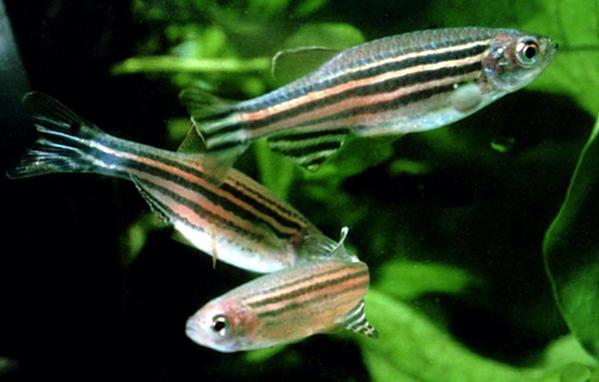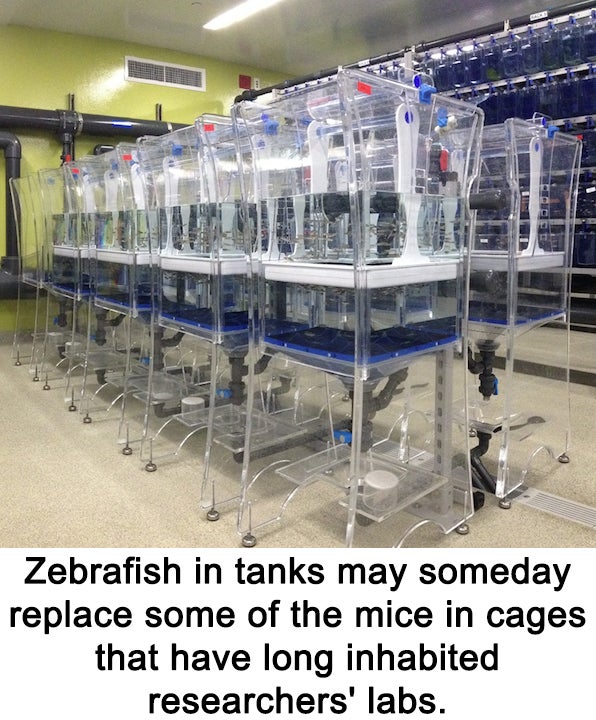Little Minnow Provides Big Insights into Human Health

Posted in GUMC Stories | Tagged biomedical research, cancer, zebrafish
(May 7, 2018) — A popular inhabitant of many freshwater aquariums, the inches-long silver and black striped zebrafish was recently given a new nickname by the organizers of the Cannes Film Festival — the “human avatar.” As the humble new darling of 17 (and counting) national and international film festivals, a 10-minute documentary featuring Georgetown and other leading researchers describes how this member of the minnow family helps advance human medicine.
Zebrafish: Practically People, Transforming the Study of Disease highlights the way these fish are being used in labs as a biomedical research model that in many ways is better than the mice and rats that have long played on spinning wheels in rows of laboratory cages. In addition to Georgetown, filming was conducted at Harvard, the National Institutes of Health and the University of Sheffield in England.
No contest with mice
Zebrafish have most of the same organs, tissues and cells as people — even a gallbladder, which rats don’t have — and because they are small and have transparent embryos, scientists can study how specific genes and cells affect the entire organism. They are superhuman — able to regrow organs such as the heart, kidney and spinal cord; are super-reproducers — females have 9,000 offspring each; and, at less than 1/1,000 the maintenance cost of a mouse, are very inexpensive.

“A lot of people, even those that approve research grants, think a mouse is a better model for a human than a zebrafish is,” says Jennifer Manner, the film’s director and producer. “I have nothing against mice, but that just isn’t the case.”
“We can get better data, spend pennies on the health care dollar, and get results in a fraction of the time if we use zebrafish,” she adds.
Manner is a person of many interests. She holds a JD and is an adjunct professor at Georgetown University Law Center, is senior vice president of regulatory affairs at EchoStar Corporation (the largest U.S. commercial geostationary orbit satellite operator), and is the CEO of ZScientific, LLC, a company focused on biomedical and technology research including that which focuses on the zebrafish model.
A self-described “zebrafish advocate,” Manner was inspired to work on the film after learning about the uses for zebrafish from her husband, Georgetown molecular biologist Eric Glasgow, PhD, who has long sung the praises of the fish-that-can.
Testing individualized cancer therapy
Glasgow developed and directs Georgetown’s zebrafish shared resource laboratory, one of the first of its kind in the world to offer full-service access to the zebrafish model.
The scientists who use the lab know that 84 percent of human genes — known to be associated with human genetic disease — have a zebrafish counterpart. And zebrafish are vertebrates (they have a spinal cord) and have more than 26,000 protein-coding genes, the largest gene set of any vertebrate to date.

“You can see them at the one-cell stage, you can manipulate them,” says Glasgow in the film. “We can increase gene expression, we can knock out genes, and then we can watch that embryo develop.”
Moreover, zebrafish produce all the major human brain neurotransmitters, so they have become instrumental for studying brain functioning. “We can artificially go in and control how neurons fire, so we can get a very good sense of how the brain interacts and control behavior,” Glasgow says.
Stephen Byers, PhD, associate director of the Georgetown Lombardi Comprehensive Cancer Center, was filmed in his laboratory describing how zebrafish are also perfect for testing individualized treatments for cancer patients.
“We can take a human tumor specimen, we can implant it in a thousand zebrafish embryos and within five days, we’ll have readouts of, for example, drug sensitivity or metastasis,” he says. “We have the potential to basically investigate that before treatment commences or shortly after treatment commences in a human.”
A passion project
Those who watch the film are amazed by all the interesting research that zebrafish have made possible. For example, because the muscle physiology of zebrafish is so much like a human’s, they are being studied on the International Space Station to help researchers better understand the effects of gravity on muscle mass.
To date, zebrafish research funding has been limited because people aren’t aware of their potential, something Manner says is changing. “So many people have seen the documentary in research and school settings, and science magazines and other journals have written articles, that zebrafish are getting the visibility that will ensure the medical community knows how valuable they can be for research. This should lead to increased funding for studies using this cost-effective biomedical model, leading to new drug and other discoveries benefiting patients,” she says.
While she did some fundraising for the film, it was largely self-funded, Manner says. “Sometimes some things just need to be done to benefit mankind.”
She adds that she hired a production team “and took their advice. I knew the story — working with professionals made it easy for me.” The film was written by Wendy Leonard, PhD, MPH.
Manner will be in Europe in May, and plans to attend Cannes “after the red carpet is laid down for the big stars and then taken up.” The official selections in the category Zebrafish will be shown in — Emerging Filmmaker Documentaries — will be screened May 15. The film festival begins on May 8.
“This has been so much fun, and so gratifying,” Manner says. “This has really been a passion project for me — for the zebrafish and all they do for us.”
Other film festivals that have picked Zebrafish as an official selection, award or finalist are: Mediterranean Film Festival, Hollywood Independent Film Festival, Academia Film Olomouc, Oregon Documentary Film Festival, New York City Short Documentary Film Festival, Technology Documentary Film Festival, Top Shorts, Best Shorts, Selected West Chester Film Festival, Documentary Colony Film Festival, ImpactDocs, Austin Spotlight Film Festival, Women Only Independent Film Festival, Short to the Point Film Festival, International Maryland Film Festival and The Monthly Film Festival.
Renee Twombly
GUMC Communications
